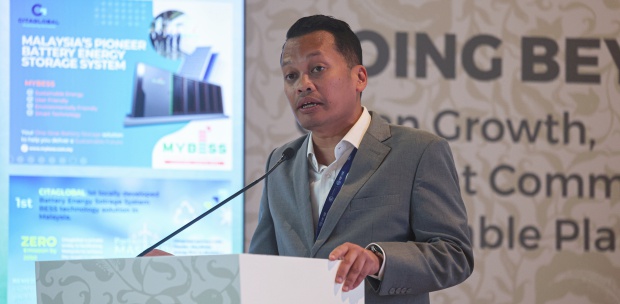KUALA LUMPUR: Synergising state and federal strategies are crucial to yield a powerful impact in implementing the planned climate change policies and achieving our net-zero goals.
Sahabat Alam Activists Association (Kuasa) chairman Hafizudin Nasarudin cooperation from the state governments was imperative given that land and forest management fall under their jurisdiction.
While Malaysia faces minimal challenges in managing industrial and urban emissions under federal jurisdiction, the primary concerns arise from emissions and disasters related to extensive land and forest activities, where the states exercised significant control.
"Under United Nations Framework Convention on Climate Change, we have pledged to maintain at least 50 per cent forest cover by 2040, but at the state level, (administrations) don't really care about this.
"We can see the rampant opening of forest, including forest reserve for mono-crop plantation, quarry, mining, vegetable garden and many de-gazettement of forest reserve.
"This makes climate change impact much worse, especially contributing to flooding, landslide, erosion, depletion of water quality and quantity, and biodiversity," he said.
Hafizudin also stressed the need to enhance climate change literacy within communities, stressing the necessity for easily understandable campaign materials to facilitate better comprehension.
Hafizudin was responding to Natural Resources, Environment and Climate Change Minister Nik Nazmi Nik Ahmad's speech at the Asean Leadership in Addressing Climate Change forum where he stressed Malaysia's commitment to addressing climate change.
Nik Nazmi said Malaysia is formulating a Long-Term Low Emissions Strategy and Nationally Determined Contribution Roadmap, which will serve as a comprehensive guideline to achieve net-zero emissions as early as 2050.
Malaysia, he added, is prioritising the drafting of a climate change bill, the establishment of a national adaptation fund and the development of a carbon market mechanism.
The plans, Hafizudin, said indicate that Malaysia is taking proactive steps in addressing the global issue.
Hafizudin suggested that Malaysia collaborate with other Asean countries to share expertise, jointly invest in green technologies, and work together to address regional challenges.
"Malaysia could leverage the 28th Conference of Parties (COP28) to strengthen commitments, seek financial and technological support for sustainable projects, and establish partnerships for knowledge exchange.
"We can engage with global leaders and advocate for inclusive, ambitious climate policies to further enhance Malaysia's strategies in combating climate change both domestically and within the Asean," he said.
National University of Singapore (NUS) department of Southeast Asian Studies lecturer Dr Serina Rahman said while it was good that Malaysia has drawn up plans to reduce carbon emissions, she stressed the need for immediate actions.
"The United Nations has just released a report that projects a three-degree rise in temperature if action is not being taken as soon as possible.
"New roadmaps and plans can take a year or more to be created, then how long will it take to be implemented?
"The effects of climate change are being felt on the ground now, extreme weather is affecting artisanal fishermen and farmers, the country's poorest communities," she said, adding that these people cannot wait for new plans, laws and action to trickle down to them.
She questioned the outcome of the conferences and climate change held in the past.
"There are so many climate change talks and conferences; people coming together to share proof of their company's efforts to be better for the environment but how much of that actually makes a real difference to people on the frontlines of climate change impacts?," she asked.
She, however, commended Nik Nazmi's effort to pursue the global climate fund.





